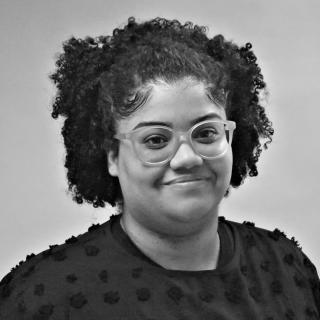
Why do Afro-Latinas feel the need to prove themselves?
AnnaMaria Fernandez, a senior at Muhlenberg College, shares what it means to be an Afro-Latina in white-dominated spaces.
AnnaMaria Fernandez, an Afro-Latina student at Muhlenberg College double majoring in Theatre and Sociology with a minor in Dance shares her academic trajectory, passion for the arts, and desire to work in DEI-related fields with AL DÍA.
Daughter to a Puerto Rican mother and a Haitian father, Fernandez stresses the importance of her identity as an Afro-Latina navigating white-dominated spaces because “as a person of color, I’m always going to have to work to prove myself in white spaces.”
“I’m always going to have to work to prove myself in other spaces as well, but I think that the privilege is getting harder for me to navigate,” explained Fernandez, who attended a predominantly white school from 1st to 12th grade.
“I didn’t have to prove myself as intelligent or worthy,” Fernandez assures since all the students already knew her.
However, things changed for the Afro-Latina at Muhlenberg, where she felt she needed to redo all her previous efforts and “work towards becoming a name representative of who I am rather than just being who I am;” an important distinction she knows goes unnoticed because of how she looks.
As an Afro-Latina, Fernandez is passionate about enacting a positive change on campus. But notes, “the Afro or the Latina gets erased in my identity” because usually, others refer to her as Black or Latina— similarly to how she perceives the institution views her.
Why not the arts?
According to Muhlenberg’s December 2022 data, the Class of 2026 has a diverse group of students, with 29.7% being students of color, of which 15.7 % identify as Hispanic or Latino — 21.7% are first-generation students. However, only 18% of students are liberal arts majors.
Fernandez is passionate about art used as a form of activism. She notes that a career in the arts is not often welcomed in the Latinx community or marginalized communities because it does not always generate financial security or mobility—reasons why she needed to ensure she could financially support her studies and still pursue a career in sociology, a more “stable” major.
“We are often taught that sports are the only way out, especially for young men,” she explained. “I don’t think that’s even half of the truth. The arts, are often silenced and underresourced [but with the right support], it can funnel the youth into positive paths.”
RELATED CONTENT
Although the arts are her passion, she admits that after taking a sociology course at Muhlenberg, she “understood the world differently, and I continued to understand the world differently.” Therefore, she plans to use her passion for theater and her new-found love for sociology to use art as activism and utilize theaters as a form of community engagement that provides programs for at-risk youths in underprivileged and underresourced communities.
“It is important to make waves in places where you don’t see people like you making those waves,” Fernandez assured.
DEI is needed
The Afro-Latina is not new to diversity, equity, and inclusion (DEI) initiatives. Fernandez was one of the students behind the creation of CARE, the Connecticut Alliance for Racial Equity. It’s mission is to “educate, raise awareness, and expunge the inherent, deeply rooted issues surrounding racial inequity in voting and education in our community,” focusing on “the next generation of young people.”
Fernandez was recently a Health Equity intern at Planned Parenthood Federation of America in Allentown, Pennsylvania, where she facilitated dialogue and lesson plans on DEI. She also wrote for their newsletter to spread resources to the employees of Planned Parenthood.
“I’ve done a lot of work as a brown woman in a white space to make white spaces more open to marginalized voices,” she emphasized. “Less in the way of, I need to be heard, and more the way of our allies must amplify our voices. And so, I hope to continue my work in belonging in some way, shape, or form.”
Her DEI efforts and involvement continue on campus as the contributing editor for Muhlenberg Academic Review, facilitator for Alliances for Justice Active Leadership (AJAL), and the public relations chair for the Students of Caribbean Ancestry Affinity Group.
Fernandez has found herself in the last three years and explains it would benefit her to be surrounded by people who do not need to defend their culture, and being amongst the Latinx community would help her emotionally and career-wise.











LEAVE A COMMENT:
Join the discussion! Leave a comment.